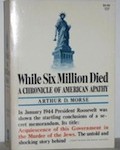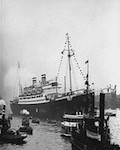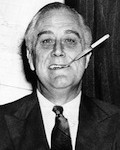The Nation, a leading U.S. political affairs weekly, spoke out early and vociferously for government action to rescue Europe’s Jews.
After the 1938 Kristallnacht pogrom in Germany, the journal called for admission to the U.S. of at least 15,000 German Jewish refugee children. The Roosevelt administration’s refugee policy “is one which must sicken any person of ordinarily humane instinct,” editor-in-chief Freda Kirchwey wrote in 1940. “It is as if we were to examine laboriously the curriculum vitae of flood victims clinging to a piece of floating wreckage and finally to decide that no matter what their virtues, all but a few had better be allowed to drown.”
In 1941, the Roosevelt administration devised a new immigration regulation that barred the admission of anyone with close relatives in Europe, on the grounds that the Nazis might compel them to spy for Hitler by threatening their relatives. The Nation’s editors denounced that theory as “reckless and ridiculous.” Nation editor Kirchwey blasted the espionage claim as “an excuse concocted by the [State Department]” to keep refugees out and “a good story with which to win popular support for a brutal and unjust restriction.”
In early 1943, at the height of the Holocaust, a Kirchwey editorial denounced President Franklin Roosevelt’s response to the mass murder in particularly strong terms. “You and I and the President and the Congress and the State Department are accessories to the crime and share Hitler’s guilt,” she wrote. “If we had behaved like humane and generous people instead of complacent, cowardly ones, the two million Jews lying today in the earth of Poland and Hitler’s other crowded graveyards would be alive and safe. And other millions yet to die would have found sanctuary. We had it in our power to rescue this doomed people and we did not lift a hand to do it—or perhaps it would be fairer to say that we lifted just one cautious hand, encased in a tight-fitting glove of quotas and visas and affidavits, and a thick layer of prejudice.”
In 1944, Kirchwey authored a moving appeal for U.S. action against the deportation of Hungary’s Jews to Auschwitz. The millions of European Jews already killed were victims of both “Nazi ferocity and Allied indifference,” she wrote. “It is untrue to say that little could have been done, once the war was started, to save the Jews of Europe. Much could have been done. At most stages Hitler was willing to permit his Jewish victims to substitute migration for deportation and death. But the other countries refused to take in refugees in sufficient numbers to reduce by more than a fraction the roll of those destined to die.”
The Roosevelt administration’s claims that it was impossible to rescue the Jews was just a flimsy excuse, Kirchwey emphasized. “[U.S.] troopships which have delivered their loads at Mediterranean ports could be diverted for a single errand of mercy. Transport planes returning from India or the Eastern Mediterranean could carry out of Hungary the 10,000 children to whom Sweden has offered shelter….The last opportunity to save half a million more lives cannot be treated as a matter of minor concern…[W]e must hurry, hurry!”
Sources: Lipstadt, Beyond Belief, pp. 19, 33, 78,99, 130, 192;
Wyman, The Abandonment of the Jews, pp.63, 89-90, 197-198;
Feingold, The Politics of Rescue, pp. 129, 141, 159, 162.











